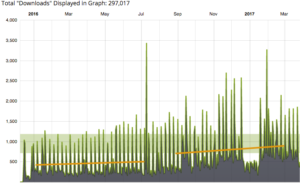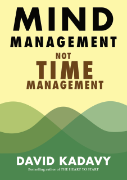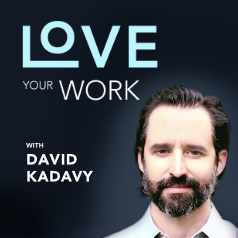Subscribe to blog updates via email »
Why I didn’t join a podcast network
If you enjoy the sensation of being punched in the stomach repeatedly, start a podcast. You put in a dozen hours to produce an hour of audio (or several weeks to produce twenty minutes), and you’ll probably never know if you did a good job. So, when you get a chance to join a podcast network, it’s very enticing. They’ll promote your show, they’ll sell your ad space, and you can concentrate on making a better show.
It’s a no-brainer, right?
I recently had an opportunity to join a podcast network, and I decided not to (for now). Here is my thought process.

WANT TO WRITE A BOOK?
Download your FREE copy of How to Write a Book »
(for a limited time)
Joining a podcast network seemed like a good idea
I started my podcast with all sorts of advantages. I already had an email list of 30,000. I had about 17,000 Twitter followers. Still, over 18 months, Love Your Work has grown to “merely” 4,000 downloads per show (it was well over 5,000, but one of my main marketing channels shut down. Any revenue projections shown in this article are for 5,000 downloads per show.)
So when a podcast network approached me, I thought it was my big break. Finally, I could stop stressing about throwing money in a pit – paying for editing, music licensing, equipment, and hosting. Finally, I could stop chasing advertisers, and just focus on making a great show.
That’s what it seemed like, anyway, until I dug deeper.
What terms do podcast networks have?
All podcast networks have their own unique terms. The basics for mine were:
- They would sell my ad inventory, and I would get 70% of the revenue. That’s totally fair.
- I had complete power to refuse an advertiser if it wasn’t a good fit. “100 percent” were the exact words used. Good!
- It would still be my show, and I’d have creative control.
- They would cross-promote my show with other shows in the network (many of which are the top shows on iTunes).
- They would push to get my show featured on iTunes.
- They would cross-promote my show with shows in other networks.
Again, it all sounds totally fair. It sounds great, in fact! I felt privileged to have this opportunity – my measly little show, in this network with some very successful shows. It sounded like a no-brainer.
How much money will you make in a podcast network?
I wanted to grow my show, but ultimately, I wanted money. The more money my show makes, the more time and care I can put into it.
When we crunched the numbers, it looked like if they managed to sell all of my ad inventory, I’d make about $950 a month.
That’s not much for how much work I put into the podcast, but it’s more than I tend to make now.
But, there were some other issues that gave me pause:
- I’d have to change podcast hosting platforms. I’d have to migrate all of my episodes over from Libsyn (my current host) to their host.
- I’d have to remove all past ads. Their hosting technology allows you to select waveforms to cut out old ads and choose insertion points for new ads to be dynamically inserted.
- I’d give up control of 100% of my ad inventory for at least one year. If they failed to sell ads, I couldn’t insert my own ads, or even spots with affiliate links in them.
Are the dynamically-inserted ads geo-targeted?
I listened to a few shows in the network, and I didn’t hear any ads. I asked my contact what was up.
It turned out that because I live in Colombia, I wasn’t being served ads. If I connected through a VPN (to make it look like I was in the U.S.), I did get some ads.
A lot of this network’s advertisers only want to advertise to people in the United States. I don’t know exactly how it works, but they probably buy a big block of ads with certain target demographics, and my show gets mixed in with other shows.
So, since about 60 percent of my listeners are in the United States, that would cut further into my earning potential.
Now my earning potential was about $538 a month, and that’s IF they’re able to sell all of my inventory. If they only managed to sell half, I’d make about $230 a month
Does the podcast network have conflicting interests?
Did you notice that $538 is not exactly 60 percent of $950? That’s because, in this network, you have to pay for your hosting. The hosting fees come out of your earnings, and the fees grow as your show does.
The saving grace here is that the hosting fees only come out of your earnings if you have earnings. If your show has no ad sales, you don’t pay for hosting.
Hosting for a show at my level would run about $100 a month. That’s quite a jump from the $15 a month I’ve been paying at Libsyn.
Do you have to change podcast hosting companies, and why?
What’s up with this hosting company anyway?
$100 a month isn’t too bad for the technology this hosting company has. I learned that Libsyn also has plans available that cost around this much – mostly because of the dynamic insertion and geo-targeting.
So, it’s not a bad hosting company. It’s actually a very good one. But when I visited their website, something I saw there gave me a bad feeling.
I haven’t mentioned yet that the podcast network that approached me is headed by a former big media executive. That’s part of what made it feel like the network would be a big step up for my podcast.
But it turns out that this executive is also involved with this hosting company.
I’m not saying it’s some big conspiracy. Podcasting is still a small industry, so it’s natural that talent involved in one company would also be tied up in another.
But to join this network, I have to move my podcast to a different host – and the head of this network is tied up with this podcast host?
This wasn’t a deal-breaker for me. I understand how – with the model of this podcast network – it would be nearly impossible to run the network without all of the shows on the same platform. But it didn’t sit well.
Does dynamic insertion and geo-targeting in podcast networks really work?
If I were in this network, all of my ads would still be “host-read” in that I would be reading them. But, they’d also be “dynamically inserted.”
I would upload a file of my ad, and it would be inserted in ad slots for all of my episodes. That’s pretty slick!
I have tons of episodes in my back catalog that have no ads in them at all. People are still listening to them, so that would really boost my available inventory for selling ads.
But, in an email conversation with Libsyn’s Rob Walch he said that advertisers don’t like dynamically-inserted ads.
…well over 95% of the campaigns are Host read ads that go live into the episode when you record it. Many advertisers are now asking specifically for ads NOT to be stitched in. They have found Ad stitched ads perform horribly when compared to live reads.
I can tell you those campaigns that are live read – we get over 90% of all those advertisers back. And for Ad stitched – it is less than 10%.
According to Rob, this is true even when the stitched ad sounds like a live read. Libsyn does offer dynamically-inserted ads through Libsyn Pro, so I don’t think Rob was just trying to scare me away from stitched ads.
So, while dynamically inserted ads sound very slick and cool, the jury is still out, at least according to one industry source, on whether they are effective for advertisers.
Do you have to remove “stale” ads?
If I had to remove old ads to insert new ones, what about past sponsors? Is it wrong to remove their ads?
The podcast network’s argument was that unless it had been specified that ads should remain, advertisers should not expect the spot to stay there forever. Once they’ve been served the number of impressions they’ve been promised, you can take out the ad and replace it.
I wasn’t especially comfortable with this, and I don’t know if they were flexible on it because I didn’t push it in that particular conversation.
Since then, however, I have made an arrangement with at least one sponsor where the ads are specified to remain in the archived version of the show.
Will the podcast network promote your show?
In the proposed contract, it was very clear what I had to do to join this podcast network. I had to change hosts, give up my ad inventory for at least one year, and make a reasonable effort to continue producing my show.
However, it wasn’t clear just what the network would do to promote my show. There was some vague language about promotion in the contract, but no guarantees.
Are they promoting other shows?
Looking around iTunes, I did see that many of their shows were featured. It looked good.
But then I talked to a couple of hosts of other shows in the network. They both said the network hadn’t promoted their shows yet.
I also searched for press releases or blog posts announcing the various shows joining the network. There were very few.
The hosts I talked to didn’t seem upset about no promotion happening yet. They were both pretty new to the network – within a few months.
Are they incentivized to promote your show? Are they incentivized to NOT ignore your show?
The podcast network was certainly incentivized to grow my show because of the revenue share. But there was no mechanism in place to incentivize them to NOT let my show collect dust (beyond selling enough ads to cover the $100 hosting fees).
I felt that the network would probably promote my show, but it was unclear what they were committing to, while it was very clear what I’d be giving up to be in the network.
Is the agreement with the podcast network flexible?
It would be a big commitment to join this podcast network. It would be a lot of labor just to move everything over to the new host, and I would give up control of my ad inventory for a whole year – with no guarantee the network would sell ads or help grow my show.
What if, after a few months, I decided it wasn’t going well. Could I get out of the contract?
Is there a trial period in the contract?
One of the hosts I talked to told me they got a 30-day “out clause” in the contract, for this very reason. If they didn’t like how things were going after 30 days, they could break the contract.
But when I requested such a clause in my contract, the network told me they had never offered such a clause, and they didn’t want to set the precedent.
I suppose I should have told them that I had heard otherwise, but strangely, I didn’t want to jeopardize the podcaster’s relationship with the network. I say strangely, because now I’m publishing it.
I don’t know if the network was deliberately saying something that wasn’t true. But, the network was incentivized to be dishonest, whereas the podcaster was not. The podcaster had volunteered the information with no prompt.
Can you trust them?
I’m not a fan of trying to dissect the motivations of people who are controlled by the interests of large entities – and the many layers of managers, executives, and investors that come along with them.
I’d be giving up control over my ad inventory, with no guarantee of how my show would be promoted, and there was no flexibility for me try out the arrangement. Plus, I wasn’t sure the podcast network was telling me the truth about the contract.
At that point, I decided to pass on the opportunity.
What do I do now?
It was a major focus for me for two weeks to evaluate and decide whether or not to join a podcast network.
At the end of it all, the door is still open if I change my mind – that’s if they’ll still have me after this post.
In the meantime, I decided to put the effort (and money) I would have put in selecting ad insertion points and migrating hosts, into growing my show instead. I’m also thinking harder about ways to monetize.
Donation-based podcast monetization?
I’ve had a Patreon page for awhile now, but I’ve hardly told anyone about it. I don’t feel the “donation” model is an effective way of making money, and the meager monthly sums I see for podcasts that put a lot of work into pushing Patreon doesn’t tell me otherwise. It’s not worth it for an extra $100 a month.
“Premium”-level podcast monetization?
I am exploring ways to provide a “premium” level: early access to episodes – perhaps ad-free episodes, and access to premium content. Libsyn provides a service that does this through your own custom app, however, they take 50%. I don’t feel that’s a fair sum, and who bothers to download the custom app of a show? (By the way, Andrew Warner’s Mixergy has a premium level with a very good custom app.)
Sponsorship-based podcast monetization?
I am starting to get direct sponsorships more frequently, so that’s currently my focus for monetization. I also learned that Libsyn can sell ads on your behalf. They take 50%, which doesn’t feel entirely fair, but it’s not totally unusual.
Will I never join a podcast network?
This isn’t meant to be a chest-pounding proclamation of my independence from podcast networks. It’s quite possible that I made the totally wrong decision. I’ll likely never know.
I’m a supporter of independent creators, and I am mostly an independent creator myself. That doesn’t mean that I’ll never join a podcast network.
I believe that sometimes it really is worth it to compromise control, and even deal with trying to dissect the motivations of people controlled by large entities, when you’re trying to achieve something big. I did it when I published my first book. That experience hasn’t been without its head-scratching moments, but overall it has been worth it.
This is just a documentation of my experience, and my thought process – as much for me to examine my own thinking, as it is for you to have something to guide your thinking if you’re considering joining a podcast network yourself. I hope it helps.




